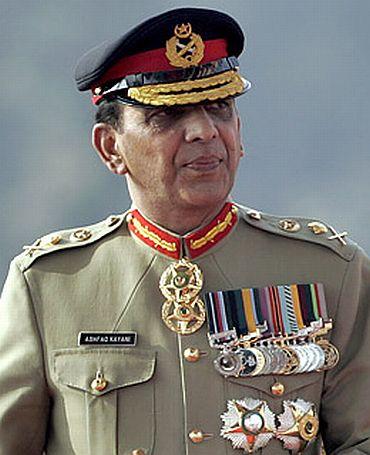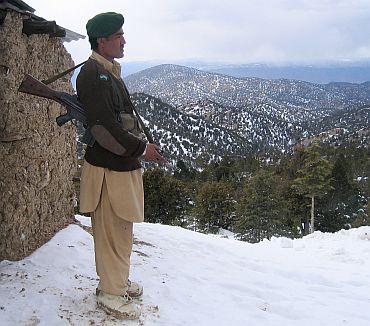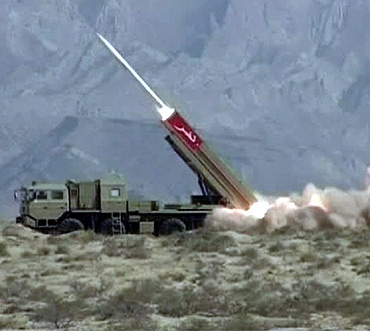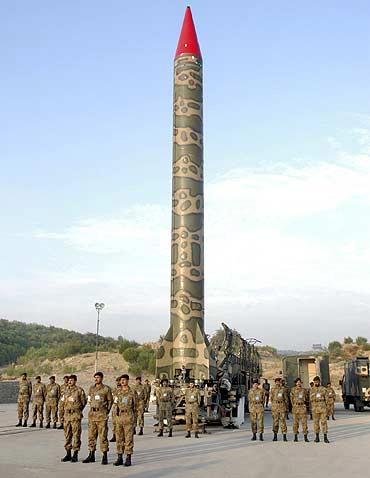 | « Back to article | Print this article |
Power game in Afghanistan: Will General Kayani have his way?
Pakistan's secreted nuclear 'jewels' has hugely burdened the economy as billions of dollars of scarce resources were being expended on modernising and upgrading atomic warheads and delivery systems by the megalomaniacal and paranoid military, says Rahul Bedi
Despite holding a weak hand in the world's most unsettled and war-torn region, Pakistan's duplicitous and nuclear–armed military rulers are yet again engaged in a dangerous round of brinkmanship poker as the new "Great Game" over Afghanistan draws down in 2014.
Like an impassive cardsharp army chief General Ashfaq Parvez Kayani has frequently bluffed his way out of many tough situations involving an enraged United States and North Atlantic Treaty Organization (NATO) betrayed repeatedly by the treacherous Pakistani military and its ruthless handmaiden, the Inter-Services Intelligence (ISI) directorate.
But despite the stacked deck and adverse odds, the impassive-faced, chain-smoking generalissimo remains the principal arbiter of Afghanistan's future.
This could well entail 'outsourcing' Afghanistan to Islamabad by a frantic and clueless Washington backed by an equally bewildered Britain as both face ignominious withdrawals from an un-winnable war, leaving unbridled chaos behind.
Click NEXT to read further...
'US has little choice but to suckle Pak's military and ISI'
Kayani seems confident that the US though furious with Pakistan for its double dealing, but militarily neck deep in Afghanistan and with no credible face saving exit strategy had little choice but to suckle his military and the ISI, however distasteful the prospect.
Their collective influence over radical, well armed and highly mobile Taliban cadres in Afghanistan was profound and irreplaceable and would, doubtlessly incite such an outcome much to the West's detriment.
The insightful gambler Kayani remains secure in the knowledge that unless Washington guaranteed Pakistan's long cherished ambition of Islamabad obtaining strategic depth in Afghanistan against nuclear rival India by 'guiding' its political, diplomatic and strategic future he could well derail Barack Obama's upcoming presidential campaign.
This could be achieved simply by priming the lethal assets the ISI controls in Afghanistan to effect even greater violence on the embattled US and NATO forces.
Click NEXT to read further...
'Blowback effect has killed over 35,000 people in Pak'
But it is a dangerous game in which Pakistanis too are reaping the terrorist whirlwind of not only our opportunism and greed but also unthinkingly supporting Islamist fundamentalist groups like the Taliban, which assassinated premier, Benazir Bhutto nurtured and installed in Kabul in the mid 1990's.
This blowback effect has triggered terrorist and suicide attacks, sectarian clashes, targeted killings and assassinations across Pakistan over the past decade in which over 35,000 people had died, 5000 of them military and law enforcement personnel.
Such unending violence had also inflicted financial damage totaling over $ 70 billion to the fragile, aid-dependent Pakistani economy.
Additionally, since 2006 the number of Pakistanis below the poverty line had increased from 27 per cent to 33 per cent, whilst the country's annual growth rate had more than halved to three per cent.
Food inflation hovered at 25 per cent, unemployment was mounting exponentially and incessant power breakdowns across the country had rendered life unlivable for millions.
Click NEXT to read further...
'Scarce resources expended on modenrising atomic warheads'
Safety from terror stacks was non-existent, corruption rampant and overseas aid for devastating floods two years in succession had been meager as donor's harboured reservation over their moneys reaching those affected by the rising waters.
Pakistan's secreted nuclear 'jewels' too had hugely burdened the economy as billions of dollars of scarce resources were being expended on modernising and upgrading atomic warheads and delivery systems by the megalomaniacal and paranoid military.
In its latest report the British American Security Information Council has warned that at tremendous cost Pakistan was developing nuclear weapons for 'war fighting roles and in military planning' against India with whom it had been to war three times since independence in 1947 and engaged in a border skirmish in 1999 in which 1200 soldiers from both sides died.
Pakistan's justification for its proliferating nuclear weapons programmes which the Stockholm International Peace Research Institute (SIPRI) recently termed the worlds fastest was its perceived vulnerability against India's larger conventional military forces.
Click NEXT to read further...
'By 2013 Pak could have as many as 100-130 nuclear weapons'
The Stockholm International Peace Research Institute also warned that that Islamabad was in danger of "losing control of part of its nuclear arsenal" to terrorists triggering afresh worldwide fears over such an apocalyptic prospect and one which the Pakistani military effectively used to blackmail the US and other Western states into supporting, financing and arming it.
Under its atomic weapons programme Pakistan had recently developed tactical strategic weapons containing 15-20 kg of fissile material that were capable of being fired even from artillery guns.
Western analysts said these posed a 'chilling threat' as terrorists could conceivably seize such a functioning battlefield weapon either directly or with help from 'compliant' field commanders , alumnus of the same madrassa's or Islamic seminaries as the radical insurgents wanting to establish an Islamic Caliphate stretching from Kashmir to West Asia.
It is estimated that by 2013 Pakistan could have as many as 100-130 nuclear weapons, including the short range, surface-to-surface 'NASR' tactical battlefield missile with a 60 km strike range.
Islamabad's record in nuclear proliferation is, at best, dubious.
Its top atomic scientist Dr Abdul Qadeer Khan was exposed in 2004 as the head of an international black market operation in nuclear technology working reportedly in collusion with the military, leaking lethal secrets to Iran, Libya and North Korea in exchange for large sums of money and long range missile designs. Details of Khan's dealings with Libya were currently emerging.
Pakistan is also the sole Islamic state with nuclear weapons and the only one where this deadly arsenal is controlled exclusively by an increasingly "Islamised" military.




